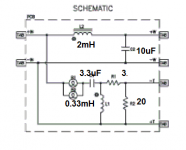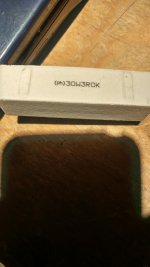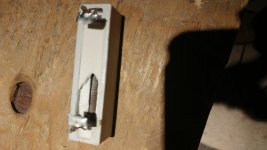Hi, I'm new to this site and hope I'm posting this in the right spot. I have a pair of Wharfedale delta 15 speakers and one of the crossovers has a broken resistor. I don't know how it broke as the speakers were suspended 15 feet in the air. Maybe it over heated and broke? It makes the woofer cut in and out as I move it. I can't tell what the value of this is by looking at the top of it. Can anyone help me find the replacement for this broken resistor? I have uploaded a picture of it.
Attachments
Is the connection to the pcb broken or is the resistor itself that has a crack or whatever? Appears like a 30Watt 3.0 ohms. Can you try measuring its resistance value with a multimeter? Best to desolder it out of a circuit and inspect closer visually and electrically.
Both leg's of this resistor are soldered to the board solid. It has cracked right where the leg's go into the ceramic on both ends. I will remove it and try to get a meter on it, but the values I'm sure will fluctuate as I move the legs around. They are very loose. While playing a tune on this speaker, the woofer would cut in and out as I moved this resistor around.
This is a 15" plus horn PA speaker.
An easy fix really. You do have another working speaker to check the resistor value with a £5 multimeter.
But 3.0R 30W looks right. Must be in the bass shunt in series with a capacitor if the bass is affected. That would make for a horribly distorted sort of crackle. Vibration probably did for it. It's good to hot glue them in place.
Commonly you'd buy 3X 10W ceramics of about 9 0r 9.1 ohms each and parallel them. Cheap as chips!
PA crossovers tend to look like this Eminence 2.5kHz design with a lightbulb or fuse limiter on the tweeter:
An easy fix really. You do have another working speaker to check the resistor value with a £5 multimeter.
But 3.0R 30W looks right. Must be in the bass shunt in series with a capacitor if the bass is affected. That would make for a horribly distorted sort of crackle. Vibration probably did for it. It's good to hot glue them in place.
Commonly you'd buy 3X 10W ceramics of about 9 0r 9.1 ohms each and parallel them. Cheap as chips!
PA crossovers tend to look like this Eminence 2.5kHz design with a lightbulb or fuse limiter on the tweeter:
Attachments
Thanks for all your help guys! The other speaker is still hanging 15' in the air so I'd have to pull it down to check it out. These things get a little heavy when you need to bring them down via ladders. I had a buddy help me get this one down and we struggled big time. I did manage to de-solder this resistor and it is all over the map with a meter on it. Lowest I saw on the meter was 9 Ohm, but with every move it changed. Here are some better pictures of it.
Attachments
So I might recommend, based on the cracking:
Overspec your replacement. Using 3 x 12 watt 1 Ohm resistors in series for insance, would yield 36 watts. Also, lift them off the board to ensure maximum cooling. Mills is pricey, but physically small and comes in 12 watt variants.
Another option is a pair of 1.5 Ohms at 20 Watts = 3 Ohms, 40 watts. You get the idea.
You'll need to balance the issues of vibration and cooling appropriately, but increasing the wattage will help reliability.
Best,
E
Overspec your replacement. Using 3 x 12 watt 1 Ohm resistors in series for insance, would yield 36 watts. Also, lift them off the board to ensure maximum cooling. Mills is pricey, but physically small and comes in 12 watt variants.
Another option is a pair of 1.5 Ohms at 20 Watts = 3 Ohms, 40 watts. You get the idea.
You'll need to balance the issues of vibration and cooling appropriately, but increasing the wattage will help reliability.
Best,
E
Thanks to all. The part store was closed today, so I'll have to wait till Tuesday. I'll let you all know how it goes once I replace it.
Not only is 3R0 the correct (or conventional) way of writing a 3.0 ohm resistor value, which uses the R like a decimal point. 30W has no other interpretation than the power handling. And it's big. So 30 Watts.

J or K is a tolerance IIRC. Might be 5 or 10%. Can't remember. Couldn't care less really since it isn't very critical. 5% on a second order component is 2.5% on frequency response, which you won't hear. It's a square root thing. 😀
You might struggle to find 3.0 ohms in a shop. The nearest preferred value is actually 2.7R or 3.3R.
I'd struggle to say what the capacitor value is. I'd google it and the brand, TBH. But looks like a MKP type at 250V. Probably between 3.3uF and 10uF judging from the size.
Looks like most of the damage was vibration shattering, and sandcast or ceramic is a bit like a china plate or cup. Bang it and it breaks unless you wrap is in soft stuff, and hot-glue is quite soft. Things get loud inside a speaker cabinet. Often breaks solder connections, crossover tracks and rigid casings.
J or K is a tolerance IIRC. Might be 5 or 10%. Can't remember. Couldn't care less really since it isn't very critical. 5% on a second order component is 2.5% on frequency response, which you won't hear. It's a square root thing. 😀
You might struggle to find 3.0 ohms in a shop. The nearest preferred value is actually 2.7R or 3.3R.
I'd struggle to say what the capacitor value is. I'd google it and the brand, TBH. But looks like a MKP type at 250V. Probably between 3.3uF and 10uF judging from the size.
Looks like most of the damage was vibration shattering, and sandcast or ceramic is a bit like a china plate or cup. Bang it and it breaks unless you wrap is in soft stuff, and hot-glue is quite soft. Things get loud inside a speaker cabinet. Often breaks solder connections, crossover tracks and rigid casings.
Last edited:
Thanks again for all of your help! I'm confident now that this is a 3 Ohm 30W resistor. I'll see what my local parts store has and up the wattage as you suggest. I'll send pictures of the fixed project soon.
- Status
- Not open for further replies.
- Home
- Loudspeakers
- Multi-Way
- Wharfedale delta 15 xover problem
![20171031_221306[1].jpg](/community/data/attachments/581/581290-1199b4f4cf841c3bdde2a57d0a07dfea.jpg?hash=EZm09M-EHD)



